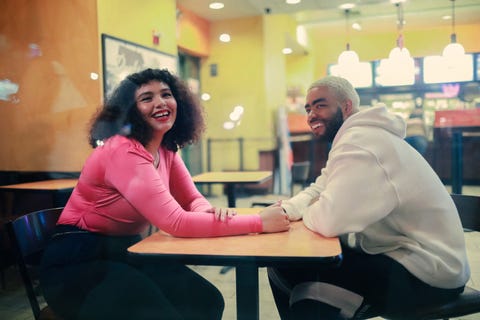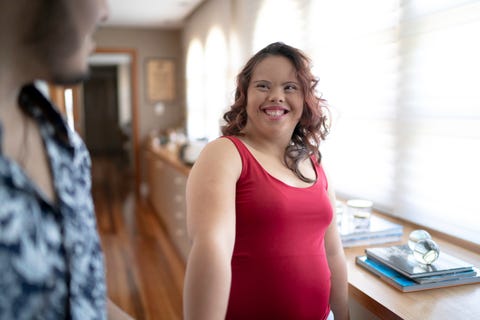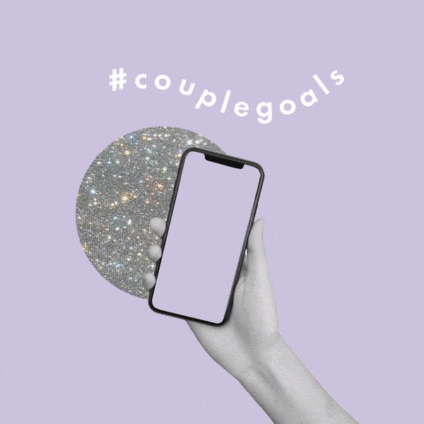John and Chrissy. Blake and Ryan. Harry and Meghan. These celeb couples all seem to have one thing in common - aside from the gilded privilege of the rich and famous, of course.
Yes, they all belong to the elite club of couples, filed neatly under #couplegoals. And it’s not just famous couples that aspire to these great heights of social standing.
This trend has filtered down to us norms through social media and careful hashtag placements. But what might seem like harmless fun, can actually allude to a much more toxic relationship narrative.
You may be familiar with the phrase, referring to the picture perfect, seemingly flawless relationships characterised by Bali photoshoots, expensive gift exchanges and public declarations of perfect harmony.
From painstakingly curated engagement announcements to professionally captured candids of unadulterated joy, the world of #couplegoals knows no limits when it comes to showing the world who’s madly in love (and who isn't).
Where did couple goals come from?

RENELL MEDRANO / REFINERY29 FOR GETTY IMAGES
The phrase first took hold at the latter end of the noughties, with the term taking rise as Instagram, Pinterest and Tumblr became a permanent fixture in our online personas.
Search “#couplegoals” online and you will find an array of idealistic relationships strewn across social media and pinned to various teen crush Pinterest boards.
Perhaps more alarmingly though, you will also discover a number of dating sites listing anything from “The Top 10 Couple Goals You ACTUALLY Want” (I’ll pass thanks!) to “20 Relationship Goals That Will Make Your Love Stronger” (I’ll take a stronger drink, if you’ve got one?!) - as if our deeply complex and personal relationships can be reduced to a tick box exercise!
So, is this trend actually just another innocent internet obsession, or is it harming our view of what makes a healthy relationship? And when put in practice, what does the digitisation of our relationships for a superficial hashtag mean for the evolution of modern love?
Jo Coker, psychologist and relationship expert, who has recently been sharing her expertise on Channel 4’s Married At First Sight, is concerned with the role social media has played in endorsing this somewhat unhealthy hashtag and the expectations that come with it.
“Social media and influencers have a lot to answer for! Many pedal a totally unreal life of perfection which influences the public. As a result many couples have totally unrealistic expectations of a relationship," she explains.
“The standards become impossible if goals are set at an unrealistic level. In turn this becomes very stressful and damaging to the relationship as the goals then become more impossible to meet.”
Rather, Jo argues that we need to take our focus off what we see online, and really engage with our IRL situationships. “Relationships are developmental and go through phases.
They habituate into patterns shaped by life events and, sometimes, they can even be a bit boring!” Of course, this is exact antithesis to the sort of fairy tales we grew up aspiring to, but haven’t we all matured past that need for perceived perfection? If this year has taught us anything, it’s to appreciate the quieter moments and truly listen to one another.
Activist and body positivity campaigner, Megan Crabbe better known by her Instagram handle @bodyposipanda, recently attracted over 92,000 likes for her Instagram post that tackled this very myth.
Discussing these “impossible standards that don’t reflect real life”, Megan spoke candidly about her experiences online and how she wants to use her platform for transparency on this topic, rather than continue to perpetuate any potentially harmful narratives.
This content is imported from Instagram. You may be able to find the same content in another format, or you may be able to find more information, at their web site.
“I never want to be the reason that someone following me feels like they're getting it wrong, simply because they're comparing themselves to something that doesn't represent reality, whether that's a post about bodies, life or relationships," she tells me. I would much rather be called "couple goals" for acknowledging the challenging, imperfect parts of my relationship than for presenting an image of a relationship that doesn't exist.”
Healthy goals
Goals, when approached from a realistic perspective, can actually be beneficial to our relationships and personal growth, Jo explains.
“Goals are aspirational but there needs to be an understanding that the difficulties of life get in the way, or may completely derail and change us. Goals need give and take from both partners to account for life events and mutual respect. Flexibility is key!” she says.
This notion of the “perfect relationship” not only affects those that are already coupled up, but it can have a damaging effect on single people too - and make them feel like they are already failing by virtue of not having a “significant other”.
As we navigate our way through a time where many of us feel isolated, even when surrounded by friends, family or colleagues, being single can be tough - especially when you are constantly met with other couples’ highlight reels.
Cate McKenzie, a couples counsellor and psychosexual therapist, explores this further. "Single people can assume that relationships may be easier to get into or simpler to be in than they are, and don’t understand that there are major gifts in being single. So often they have not been given the idea or the model that being single is also potentially a beautiful and self-sustaining place where you can focus on your goals, visions and needs,” she says.
Indeed, this hashtag does a lot to make us question our own worth as individuals and creates harmful stigmas that we internalise. Even when we are coupled up or do feel the love of another, these can muddy our judgement.
This is something that Emily, 25, can relate to, as the #couplegoals mantra stripped her of her autonomy.
“Getting called ‘couple goals, both online and IRL, repeatedly pretty much led me to stay in a dead, unhappy relationship for years longer than I should have. I became so obsessed with how we were viewed from the outside, how people thought we were so good, cute, and happy together, that I was absolutely mortified of breaking it off for fear of dissolving the facade and disappointing everyone.”
Psychologically, it can require a lot of inward reflection to step away from these toxic perceptions, and a process of re-establishing your priorities before entering into a relationship that is right for you.
Thankfully, Emily was able to do this, and the difference in her current reality is far greater than any online persona she may have curated. “It's been an interesting ride unlearning a lot of those societal standards while I try to navigate a newer, much healthier relationship," she says.

FG TRADE
"We are much more communicative on a level I've never really felt before, which has helped both of us in deciding how we want to portray our relationship to both our closer circles and to the world. As soon as I discovered that people really care about me as a singular person through leaving my last relationship rather than some half real ideal I felt I was upholding, a lot of weight came off my shoulders.”
We are all guilty of mindless scrolling and the hypnotic escapism this can provide, but it can become dangerous when we don’t truly engage with the content we are facing.
Online, we are predominantly presented with idealised images of #couplegoals that fall under a heteronormative guise, and very rarely do we associate these aspirations with anyone outside of the white, cis-gendered, able-bodied “norm” that we have come to recognise from popular culture.
Sex educator, Portia Brown agrees, saying, “A lot of us who fall outside of this cis-heteronormative model find ourselves still trying to achieve the elusive couples goals in our partnerships. This can be harmful because we may be forcing ourselves or our partners into heteronormative roles when that’s not at all who we truly are."
"This can cause a whole host of issues! This can manifest in expecting your partner, or yourself, to perform gender in a certain way, or even feeling like your relationship is less legitimate because of your sexuality or gender expression.”
In effect we need to normalise that all relationships are unique, and actually, there is no “normal”. If we continue to aspire to the #couplegoals associated with the Chrissy and Johns of the world, we are going to miss out on the authentic, personal connections we could be making in our own realities.
With so many of us attaching our metrics of success and happiness to what we find online, isn’t it time we stopped playing into these unrealistic standards and start listening to what we really require on a base level? Instead of trying to live up to the list of priorities we associate with #couplegoals and the disappointments these are bound to bring, we should set realistic goals that have an aim to bring us
Latest Stories
-
Revenue growth to slowdown to GH¢209.3bn in 2025; T-bills will not be restructured – IC Research
43 minutes -
Deloitte celebrates end-of-year Thanksgiving Service
1 hour -
Inflation to end 2025 between 10% and 12% – Databank Research
1 hour -
Government’s commitment to fiscal consolidation to remain strong in 2025
1 hour -
ImageBureau, April Communications take theatre to Nsawam Prisons
2 hours -
Bird flu kills 20 big cats at US animal sanctuary
2 hours -
Your peaceful conduct saved the country from tension – Clergymen commend Bawumia
2 hours -
A Nite of 1031 Laughs & Music to provide emergency insurance for patrons
2 hours -
Body found in wheel well of United plane after landing in Hawaii
2 hours -
Ghana Armed Forces dismisses viral audio alleging ammunition transfer
2 hours -
Former Hohoe MP Bernice Adiku Heloo passes on
4 hours -
CODEO calls for re-run of Ablekuma North, Dome Kwabenya parliamentary elections
4 hours -
4,155 cholera cases with 35 deaths recorded by December 23 – GHS
5 hours -
Mothers celebrate arrival of Christmas Day babies at Ridge Hospital
7 hours -
Alleged National Security operative remanded over GH₵1m recruitment scam
8 hours

